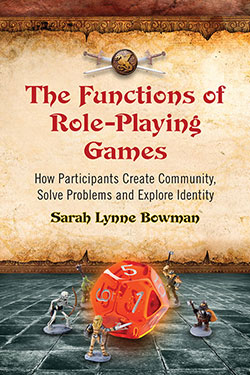The Functions of Role-Playing Games: How Participants Create Community, Solve Problems and Explore Identity: Difference between revisions
IdiotSavant (talk | contribs) mNo edit summary |
IdiotSavant (talk | contribs) mNo edit summary |
||
| Line 11: | Line 11: | ||
}} | }} | ||
==Summary== | ==Summary== | ||
'''The Functions of Role-Playing Games: How Participants Create Community, Solve Problems and Explore Identity''' by | '''The Functions of Role-Playing Games: How Participants Create Community, Solve Problems and Explore Identity''' by Sarah Lynne Bowman, published in 2010, takes an analytical approach to the world of role-playing games, providing a theoretical framework for understanding their psychological and sociological functions. Sometimes dismissed as escapist and potentially dangerous, role-playing actually encourages creativity, self-awareness, group cohesion and "out-of-the-box" thinking. The book also offers a detailed participant-observer ethnography on role-playing games, featuring insightful interviews with 19 participants of table-top, live action and virtual games. | ||
==Additional links== | ==Additional links== | ||
Latest revision as of 23:12, 7 January 2017
The Functions of Role-Playing Games: How Participants Create Community, Solve Problems and Explore Identity

- Author
- Sarah Lynne Bowman
- Publisher
- McFarland
- Year
- 2010
- Language
- English
- Pages
- 216
Summary
The Functions of Role-Playing Games: How Participants Create Community, Solve Problems and Explore Identity by Sarah Lynne Bowman, published in 2010, takes an analytical approach to the world of role-playing games, providing a theoretical framework for understanding their psychological and sociological functions. Sometimes dismissed as escapist and potentially dangerous, role-playing actually encourages creativity, self-awareness, group cohesion and "out-of-the-box" thinking. The book also offers a detailed participant-observer ethnography on role-playing games, featuring insightful interviews with 19 participants of table-top, live action and virtual games.
Additional links
- The Functions of Role-Playing Games at McFarland Books